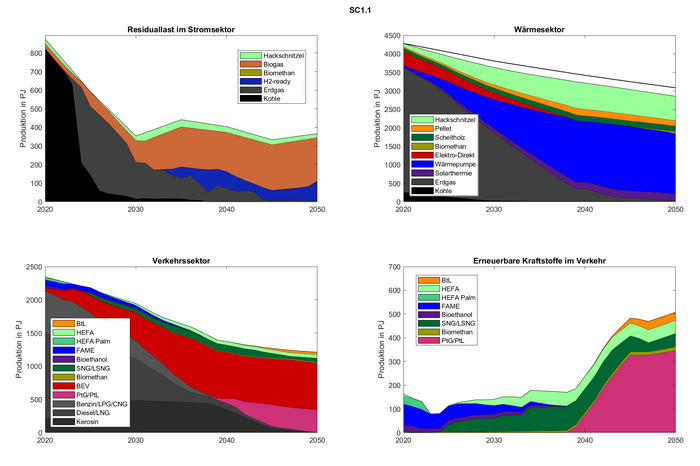What is the optimal role of limited biomass in the national energy transition and what are the priority target markets for bioenergy sources? These questions were addressed by a team of researchers from the German Biomass Research Centre (DBFZ) and the Helmholtz Centre for Environmental Research (UFZ) in the successfully completed research project “SoBio – Scenarios of optimal biomass use for energy by 2030 and by 2050”.
Bioenergy makes a significant contribution to meeting the energy needs of the transport, heating and electricity sectors and, in harmony with existing renewable and fossil energy sources, will continue to be a relevant option for energy supply in various sectors in the future. In the “SoBio” project realised jointly with the Helmholtz Centre for Environmental Research (UFZ), the Leipzig research team modelled a total of 111 different bioenergy options for the first time in great detail in scenarios. Bioenergy options were considered to cover the residual load and to balance out the fluctuating renewable energies in electricity generation. In addition, bioenergy technologies can be used in the heating sector to cover the energy demand in the three sectors of industry (low, medium and high temperature), buildings (private households, commerce and trade) and district heating. In the transport sector, biofuels also serve as a fulfilment option in the six sub-sectors of road/passenger transport, commercial vehicles, aviation, rail, inland waterways and overseas vessels.
“The modelling results developed in the project have shown that biomass has its cost-optimal benefit especially in those sectors where direct electrification is not possible or only possible to a limited extent. Thus, bioenergy remains indispensable for the success of the energy transition if considerable additional costs are not to be accepted via the production and import of power-to-x energy sources,” says Dr Kathleen Meisel, a scientist at the DBFZ.
According to the BENOPT model used, in the heat sector the largest amount of biomass is used in the form of wood chips from wood residues and miscanthus for high-temperature industrial applications. In the electricity sector, the use of biogas from domestic fermentable residues and waste or maize, as well as smaller amounts of waste wood in waste wood-fired CHP plants to flexibly meet the demand for residual load, is the most cost-effective option in the long term. In the transport sector, road and rail transport should be electrified at optimal cost. In the long term, biomass will thus be used as biokerosene in air traffic and as liquefied biomethane in shipping.
The results were classified and discussed in a final workshop on 20 April with a total of 292 participants. The underlying assumptions as well as the main results and conclusions are presented on the project website www.dbfz.de/sobio (german language)
Smart Bioenergy – innovations for a sustainable future
The DBFZ works as a central and independent thinker in the field of energy and material use of biomass on the question of how the limited available biomass resources can contribute to the existing and future energy system with sustainability and high efficiency. As part of the research the DBFZ identifies, develops, accompanies, evaluates and demonstrates the most promising fields of application for bioenergy and the especially positively outstanding examples together with partners from research, industry and public. With the scientific work of the DBFZ, the knowledge of the possibilities and limitations of energy and integrated material use of renewable raw materials in a biobased economy as a whole should be expanded and the outstanding position of the industrial location Germany in this sector permanently secured.
Contact
Dr. Kathleen Meisel
Phone: +49 (0)341 2434-472
Source
DBFZ, press release, 2023-05-10.
Supplier
Deutsches Biomasseforschungszentrum GmbH (DBFZ)
Helmholtz-Zentrum für Umweltforschung (UFZ)
Share
Renewable Carbon News – Daily Newsletter
Subscribe to our daily email newsletter – the world's leading newsletter on renewable materials and chemicals













